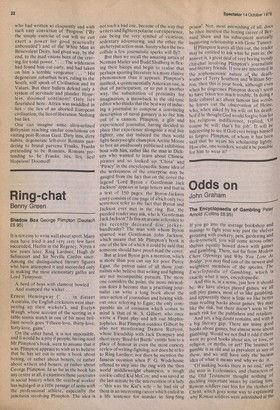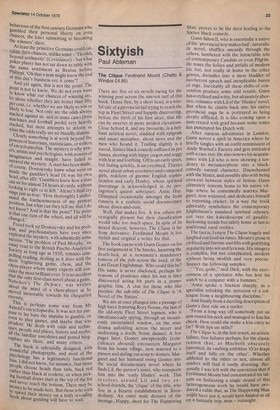Odds on
John Graham
The Encyclopaedia of Gambling Peter Arnold (Collins £6.95) if you go into the average bookshop and manage to fight your way past the shelves groaning with cookery, pets, gardening and do-it-yourself, you will come across other shelves equally bowed down with games and gambling. There, not far from Modern Chess Openings and Why You Lose At Bridge, you may find one of the newest and weightiest members of the species, The Encyclopaedia of Gambling, which is exactly what it says, encyclopaedic. And this is, in a sense, just how it should be. We have always played games, we all still play games, most of us like gambling, and apparently there is little we like better than reading books about games. We may like the risk, but there doesn't seem to be much risk for the publishers and retailers. And yet, a big doubt remains, and with it a big literary gap. There are many good books about games, but almost none about gambling. Would we not find it odd if there were no good books about sex, or love, or religion, or myths, or art? The instinct to gamble is as old and as prevalent as any of these, and we still have only the haziest idea of what it means and why we do it. 'Of making books there is no end,' says the man in Ecclesiastes, and characters of the Old Testament thought nothing of deciding important issues by casting lots. Roman soldiers cast lots for the clothes of Christ, which goes some way to explaining why Roman soldiers were astonished at the behaviour of the first century Germans who gambled their personal liberty on even chances, the loser submitting to becoming the winners' slave. At least the primitive Germans could calculate their chances, unlike some beyond arithmetic' (Coriolanus)— but what Poker player has not sat down to table with the same sentiment as Brutus before Philippi. 'Oh that a man might know the end of this day's business ere it come'? And yet again, this is not the point. The Point is not to know. We do not even want to know what our chances of winning are, let alone whether they are better than fifty Per cent, i.e. whether we are likely to win or likely to lose. Not only are the odds always stacked against us, and in some cases (fruit machines and football pools) very heavily stacked, but most attempts to inform US what the odds really are we blandly dismiss. Clearly something is at work beyond the Powers of historians, statisticians, or writers of encyclopaedias. The mystery is why writers, artists and psychologists with powers of imagination and insight, have failed to unravel the mystery. A start has been made, of course. Dostoievsky knew what went on inside the gambler's head (it was his own head, after all): 'Gamblers know how a man can sit for almost 24 hours at cards, without looking to right or to left' Alexei's final cry rings just as true; 'How thoroughly I understand the loathesomeness of my present position, but what can they tell me that I do not know? And is that the point? The point is that one turn of the wheel, and all will be changed.'
Freud took up Dostoievsky and his problem, and psychoanalysts have ever. since explored the mystery, with admittedly some success. 'The problem of Paul morphy,' an essay read to the British Psycho-Analytical Society as long ago as 1930, remains compelling reading, dealing as it does with the most frightening game, chess, and the chess-player whom many experts still consider the most brilliant ever. It is no accident that the only first-class novel about a game, Nabokov's The Defence, was written about the mind of a chess-player as he moved inexorable towards his chequered eternity. This is perhaps some way from Mr Arnold's encyclopaedia. It was not his purPose to lay bare the impulse to gamble, or even to play games, and maybe that was Prudent. He deals with odds and techniques, people and places, history and myths; all the familiar anecdotes and potted biographies are there, and many others. The book is splendidly designed, with wonderful photographs, and most of the PsYchology has a legitimately functional bias. I did not know, for instance, that more People choose heads than tails, back red rather than black at roulette, or when picking football draws start at the top of the list and never reach the bottom. There may be money to be made here. But those who wish t,c) sPend their money on a truly revealing book about gamling will have to wait.



































 Previous page
Previous page